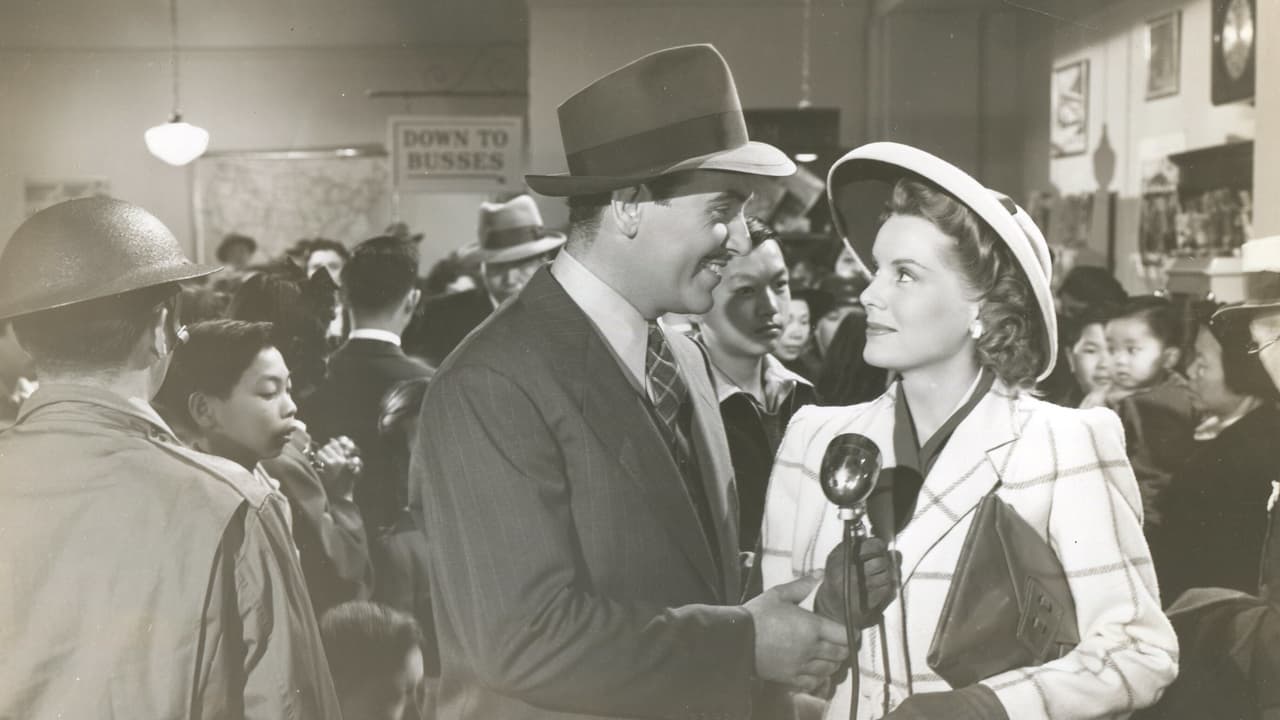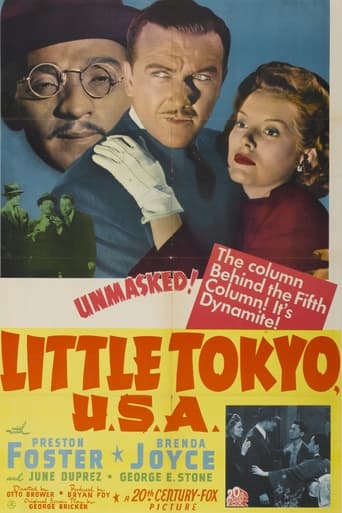Peereddi
I was totally surprised at how great this film.You could feel your paranoia rise as the film went on and as you gradually learned the details of the real situation.
Fairaher
The film makes a home in your brain and the only cure is to see it again.
filippaberry84
I think this is a new genre that they're all sort of working their way through it and haven't got all the kinks worked out yet but it's a genre that works for me.
Patience Watson
One of those movie experiences that is so good it makes you realize you've been grading everything else on a curve.
gordonl56
LITTLE TOKYO U.S.A. – 1942This rather nasty film is a low budget flag-waver from the B unit at Twentieth Century Fox. It stars Preston Foster as a Police Lt assigned to the Los Angeles district known as "Little Tokyo", an area where many of the local Japanese American population live and work. The film starts a month before the Japanese attack on Pearl Harbor. The Japanese have sent an agent, Harold Huber to take control of the Axis spy apparatus in Southern California. Needless to say every Japanese around, seems to be in on the fifth-column act.Foster has been a cop in the area for years and senses something nefarious is afoot. He warns his boss, Captain J. Farrell Macdonald of his suspicions, but these are blown off. Foster's girl, Brenda Joyce works for a local news radio station. She also thinks Foster is letting his suspicious nature get the better of him. Foster enlists the help of a Japanese American he was at college with, Richard Loo. He wants Loo to look in on a few people he has heard rumours about. Of course Loo shows up the next day on a slab at the morgue. It takes a bit of detective work to identify the body, since it is sans head.Now Foster knows, there is more than a few rats in the cheese cupboard. He starts raiding homes and business he suspects of being involved. This just gets him warnings from headquarters when the locals complain about his tactics. Now we discover that Foster's girl, Brenda Joyce's boss at the radio station, Don Douglas, is really a Nazi. He is in with the Japanese bunch gathering intelligence for the Axis. They use the radio transmitter at the station to send out coded messages. Foster however keeps being an annoyance to the spy network. They decide to use one of their female operatives, the exotic looking, June Duprez to bag Foster. Duprez is to call up Foster and tell him she has some important information, then, lure him to a meeting. Foster bites and is soon meeting with Duprez. She hands him a drink and then starts with a cock and bull story of spies etc. The drink of course was drugged and Foster is soon face-down on the floor. Douglas and Huber join the pair. Douglas pours a healthy jolt of whiskey down Foster's throat. They then muss up his clothes, and take his gun. Douglas now shoots Duperz and plants the gun back on Foster. Douglas says to Huber that Duperz has died for the cause. A quick phone call to the Police is now made. Foster is slapped in jail on a murder beef. Of course everyone believes that Foster has finally went over the edge. What with all the complaints etc against him of late. Now December 7th arrives and maybe Foster was not so nuts after all. With some aid from others, Foster soon busts out of jail. He hides out at the city morgue, the last place anyone will look for a living person. He then spends his night's shadowing the same people he suspected before. It does not take long before he turns up the proof required. There is now a round-up of the Axis bunch for a date with the rope. There is more than a little heavy handed spreading of anti-Japanese sentiment in this one. There is a lecture, both at the start, and the finish, about the need to relocate those of Japanese heritage. Seen today, this comes across as hard racism, but at the time, there was real fear of a fifth column. Hard to second guess history, but in reality there were no charges of espionage ever brought against a Japanese American during wartime. (American born Iva Toguri, one of several women dubbed Tokyo Rose, did face charges of treason after the war for her broadcasts)The film was a hit and packed the theatres. Brenda Joyce is best remembered today as the second actress to play "Jane" in the popular TARZAN films. June Duprez was on the big screen between 1936 and 1947. Her biggest film was 1947's CALCUTTA, where she played opposite rising star, Alan Ladd.
posmodern2000
If an idiot like Miss Jones can return to radio after something like the "Tsunami Song" incident and after put a lot of dirt on the memory of Martin Luther King's struggle to avoid someone can call today Jones a "beep", it's because the mainstream don't know or try to deny the history of anti-Asian racism in the West, including Hollywood.This comment it's not mine, but of Shuriken in http://forums.yellowworld.org/showthread.php?t=10781 It's a list of "yellow face" movies, films with white people pretending to be Asian like the infamous Mickey Rooney's Yunioshi of "Brakfast at Tiffany's"."The main reason why this movie is not at the top of the list is because it has faded from popular memory. But in its day, Little Tokyo, U.S.A. exemplified yellow face at its most pernicious. While other works had used Asian make-up to ridicule or vilify Asian features, this B movie used yellow face directly to deny a group of Asian Americans their civil rights. The story, set in late 1941, follows tough Los Angeles cop Michael Steele (Preston Foster) as he investigates a series of crimes involving the local Japanese American community. The story gradually reveals that the crimes are to cover up a Japanese American cabal's efforts to facilitate Japan's bombing of Pearl Harbor. After the horrific military attack, the Japanese American community's demonstrations of pro-U.S. patriotism are portrayed as patently insincere. Policeman Steele tracks the crime trail to an American-born spy for Tokyo, Takimura (played in yellow face by Harold Huber). Takimura is shown to represent that even Japanese Americans who are born in the U.S. can't be trusted. Takimura tries to throw Steele off the case by enlisting a neighborhood vixen, Teru (June Duprez, pictured out of make-up in a publicity still above), to seduce him. If Little Tokyo, U.S.A. had been made 20 years later, Teru and Steele might have consummated the seduction. But this being the miscegenation-phobic '40s, Takimura instead murders Teru and frames Steele for the crime. Nevertheless, Steele ends up proving his innocence and busting the spy ring. The movie ends extolling the necessity for the internment. In retrospect, knowing that not a single charge of espionage was ever brought against a Japanese American during wartime, this sensationalistic story reeks of racist propaganda. Granted, the film would not have been any better if Japanese American actors had played these propagandistic roles. But Little Tokyo, U.S.A. stands as a cautionary reminder of just how horribly a community's image can be distorted when it's not there to represent itself."

